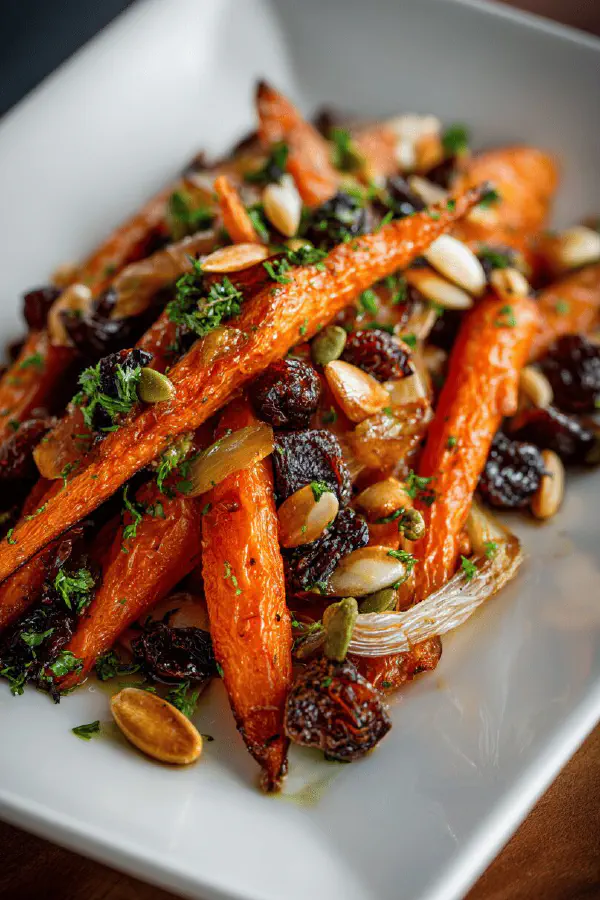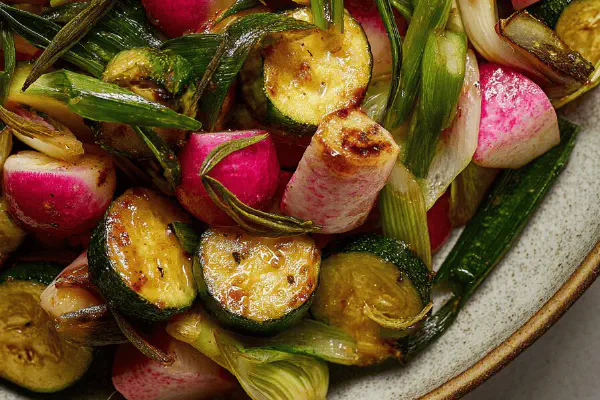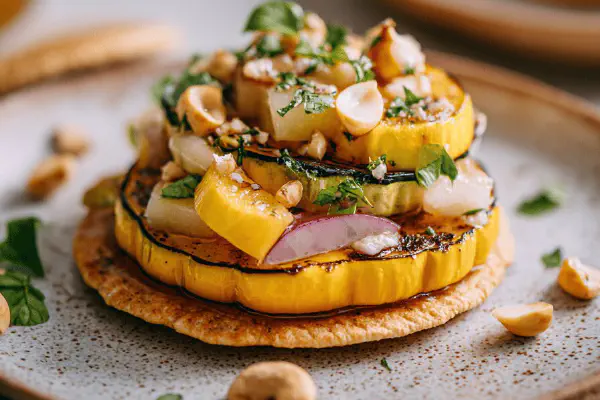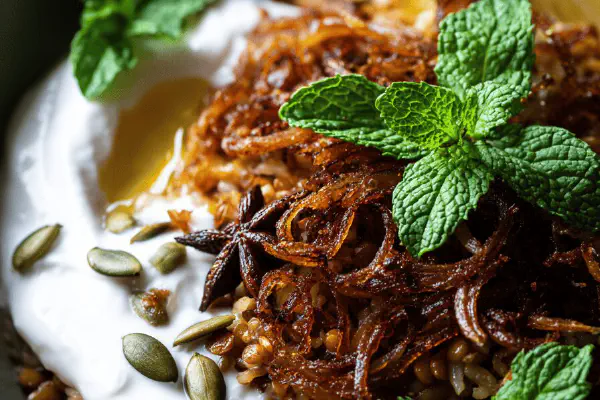Featured Recipe
Roasted Carrots with Dried Fruits

By Kate
"
Roasted carrots sliced on bias with garlic and onions, tossed in olive oil. Pine nuts swapped for toasted sunflower seeds; apricots replaced by diced dried figs. Dried cherries instead of cranberries. Salt and pepper seasoning. Pan sear then oven roast until tender and caramelized. Stir in seeds and fruit at the end for contrast. Aroma deepens as natural sugars brown. Suitable vegan, gluten free, nut free, dairy free, egg free. Handy with pork or poultry spiced dishes.
"
Prep:
25 min
Cook:
55 min
Total:
Serves:
6 servings
vegan
gluten free
French-inspired
healthy
Introduction
Carrots—simple, humble, sometimes overlooked. But roast them right, and they turn caramelized, sweet, a textural playground. Dry fruit adds chew, a little surprise. Swap pine nuts out when allergies or cost presses. Sunflower seeds step in with crunch and toasted notes. Garlic and onions build aromatic layers. Don’t rush the roasting; the low moisture, slow caramelization is key. Tossing midway ensures even cooking, no black spots, no stubborn raw centers. Infusion of olive oil smooths edges and helps caramelization. Watch for that faint smell of roasting garlic—it means flavor is locked in. Matching textures critical. Dry fruits softened but retaining bite. Seeds toasted, not burnt. Let flavors mingle but keep elements distinct. A vegetable side worth the effort, even for meat dinners or vegan spreads needing punch. Intense flavor from simple ingredients. No fuss but no shortcuts either.
Ingredients
About the ingredients
Carrots should be fresh, firm, peeled for even roasting and best texture. Slice on bias for more surface area exposure—more caramelization points. Keep pieces consistent size; uneven cuts cause patchy cooking. Garlic crushed and split releases essential oils without burning as quickly. Olive oil quality matters—extra virgin if possible, since flavor comes through when roasting. Onions quartered large enough not to disintegrate during 50 minutes roasting. Sunflower seeds replace pine nuts safely for allergies or budget and maintain desired crunch. Use dried cherries for tart burst; swap cranberries if unavailable. Figs instead of apricots add deeper sweetness, chewy texture. Salt and freshly cracked pepper fundamental; add sparingly first to adjust later. Keep dried fruits roughly chopped but not pureed—texture contrasts must remain.
Method
Technique Tips
Start with olive oil warm but not smoking. Too hot will burn garlic, too cool won’t sauté veggies properly. Move quickly but don’t crowd pan—overcrowding steams instead of browns. Sauté carrots and garlic until you detect a faint sizzle shift, edges light golden, smelling sweet and aromatic. Add onions, fold in gently to avoid breakage. Proper seasoning critical early on, but err on lighter side. The oven roast finishes the flavor buildup with gentle caramelization—slow, patient; stirring midway prevents one-sided charring, encourages even softening. Test carrot tenderness with skewer, should slide in easily but resist total collapse. Adding nuts and fruits last is deliberate—avoid sogginess, preserve crunch. Once mixed, resting off heat lets ingredients meld and flavors deepen without continued breaking down textures. Use pan with good heat retention, oven-safe, to streamline steps and improve flavor concentration. Skip stirring too often during roasting to allow natural crust to form. Adapt timing based on carrot size and oven accuracy. Serve warm but not scorching to appreciate nuances.
Chef's Notes
- 💡 Use fresh firm carrots, peel and slice bias; ensures maximum caramelization. Sized consistently for even cooking. Keep oil warm, not smoking—burnt flavors ruin garlic. Sunflower seeds bring crunch; swap in allergies, keep texture.
- 💡 Sauté garlic and carrots until golden edges. Listen for faint sizzle—means flavors infusing. Add onions—big enough not to fall apart. Perfectly seasoned from start—adjust later. Careful: overcrowding steams veggies.
- 💡 Roast at 205°C; patience is key. Stir midway, prevents burnt spots. Want tender yet firm carrots—toothpick test. Remove from oven; add fruits and seeds last. Preserve texture, not mushy. Warm through, then serve.
- 💡 Test for doneness, skewer slid in easily but not collapsing. Resting off heat melds flavors, keeps ingredients distinct. Use heavy, heat-retaining pan—better flavor concentration.
- 💡 Keep an eye on garlic—burnt means bitter. Mix short and long sentences when explaining dos and don’ts. Don’t rush—let aromas signal when ready. Adapt timing for carrot size.
Kitchen Wisdom
Can I swap other dried fruits?
Yes, raisins work too. Extra sweetness, different texture. Try pitted dates but chop smaller. Adjust sugar if needed. Keep chewiness.
What if carrots are soggy?
Key reasons: too much oil or steaming. Oven temperature too low. Should be golden and tender. Use a thermometer; check oil temperature.
How to store leftovers?
Fridge in airtight container. Consume within 3 days. Reheat in oven; microwaving makes soggy. Add fresh herbs before serving for vibrancy.
Can I prep in advance?
Yes, chop carrots a day ahead. Keep in cold water. Roast day of for best results. Flavor benefits from resting but textures could soften.



